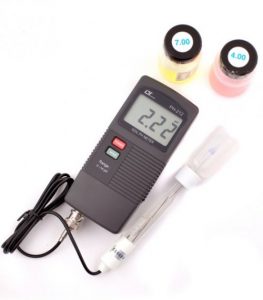You may have heard of a soil pH tester. You may even own one at home. A soil pH tester is a device used to measure the acidity or alkalinity of your soil. If you have a well-balanced soil with a good amount of nutrients, it should be fairly easy to maintain a healthy pH balance. However, if there is excess alkalinity or acidity in your soil, you will need a soil pH tester to monitor the levels of these pH components in your soil.
A soil PH tester works by using a couple of electrodes attached to a conductivity and resistance meter. The first reading is taken as the input data, and the second reading is the output of the meter. Usually, the input data has some form of chart that helps you identify which factors affect the reading. For instance, if you have a grass field, then there are probably some trees planted along the edges and along the soil slope. Other factors such as the sun intensity and rainfall affect the moisture level in the soil, which also affects the nutrient level.
 You must not rely solely on the soil PH tester readings when determining the quality and type of soil you have. There are many other factors to consider. For example, the length of the growing season, the local weather, the soil’s water availability, and the fertilizer used to supplement the plant nutrients. In addition, the readings from the meter can be inaccurate because the soil has only been covered and watered for a short period of time. Such an occurrence is called sampling bias.
You must not rely solely on the soil PH tester readings when determining the quality and type of soil you have. There are many other factors to consider. For example, the length of the growing season, the local weather, the soil’s water availability, and the fertilizer used to supplement the plant nutrients. In addition, the readings from the meter can be inaccurate because the soil has only been covered and watered for a short period of time. Such an occurrence is called sampling bias.
The most accurate way to determine the quality of your soil, however, is to purchase a soil ph meter and perform your own testing. When you use a soil pH tester, you will only get a normal to high reading. Such results can only mean that the soil is relatively acidic or alkaline. It could mean that it is moderately acidic or alkaline. It is impossible to predict accurately what the pH value of a specific variety of plant will be before you actually try growing plants that contain the same pH or acidity level as your garden soil.
Many gardeners have attested to the accuracy of the soil pH tester. The fact that the results come out so accurately, even after a long and hard day of planting, is a welcome relief to many gardeners who suffer with incorrect results from soil tests. Instead of spending countless hours sifting through the data the soil pH meter provides, they can just plug it in, wait for the results, and then use their gardeners’ calculators to determine the correct pH level.
So, you can see that an pH meter is the better choice for most gardeners. But if you do not have access to one, don’t worry. You can still test your soil’s pH level with a simple homemade soil testing kit. Just buy a small container, fill it with tap water, add a few drops of acid-free soil mix (the variety you can find at any garden center), and let the thing grow for a couple of weeks. Before you know it, you’ll have a perfect pH soil mixture.